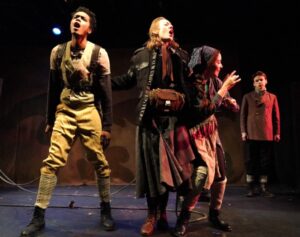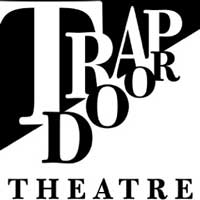
 *** Trap Door Theatre continues its 30th anniversary season with Bertolt Brecht’s “Mother Courage and Her Children”, a chronicle musical about the Thirty Years’ War. Translated from the German by Eric Bentley, the show is a rumination about the horrors of war and an exploration of the way that money and the prospects for profit stoke the war machine, no matter what the era. Brecht wrote this play in 1939 on the precipice of World War II and drew the parallel between Germany’s involvement in the Thirty Years’ War with the German invasion of Poland over 300 years later. At the heart of his musical is the normalization of killing and violence in both eras as a result of senseless and unnecessary military aggression. While the names and the faces will have changed over the centuries, there will always be soldiers, civilians, victims, and war profiteers—and of course, there has to be a religious, political, or otherwise noble pretense that gives men permission to act the opposite of what they would do during peacetime, such as killing, raping, pillaging, and engaging in all manner of cruelty. These would be considered crimes in normal times; but Brecht shows us that during war, there is no sin in employing any means to achieve an end that is being defined as a just cause. Plus, war can warp a person’s morality so thoroughly that it can make the accumulation of spoils become a way of life.
*** Trap Door Theatre continues its 30th anniversary season with Bertolt Brecht’s “Mother Courage and Her Children”, a chronicle musical about the Thirty Years’ War. Translated from the German by Eric Bentley, the show is a rumination about the horrors of war and an exploration of the way that money and the prospects for profit stoke the war machine, no matter what the era. Brecht wrote this play in 1939 on the precipice of World War II and drew the parallel between Germany’s involvement in the Thirty Years’ War with the German invasion of Poland over 300 years later. At the heart of his musical is the normalization of killing and violence in both eras as a result of senseless and unnecessary military aggression. While the names and the faces will have changed over the centuries, there will always be soldiers, civilians, victims, and war profiteers—and of course, there has to be a religious, political, or otherwise noble pretense that gives men permission to act the opposite of what they would do during peacetime, such as killing, raping, pillaging, and engaging in all manner of cruelty. These would be considered crimes in normal times; but Brecht shows us that during war, there is no sin in employing any means to achieve an end that is being defined as a just cause. Plus, war can warp a person’s morality so thoroughly that it can make the accumulation of spoils become a way of life.
Holly Cerney makes for a convincing Mother Courage. She perfectly looks the part and holds the story together with her dynamism and forthrightness. This is a woman who has two goals: to keep herself financially afloat by selling her wares (mostly guns, military accoutrements, and alcohol) and making sure that her three children survive the conflict. What we learn from her example is that winning the peace is not as profitable as fueling the war, and she is willing to sacrifice her own joys in the name of garnering additional proceeds for herself. This circumstance is demonstrated by her relationship with the Swedish cook, portrayed by Kevin Webb in a standout performance (that features his enchanting singing voice). The cook not only represents the fact that people have to eat both in wartime and peacetime but, in addition, he has the capability to take Mother Courage away from the crux of battle so that she could lead a more peaceful and normal existence as a civilian in Utrecht. Yet the lure of profit-making is just too tempting, so she refuses him. Other characters include Mother Courage’s sons Eilef (Bill Gordon) and Swiss Cheese (Rashaad A. Bond) and her mute daughter Katrin (Joan Nahid in a perfectly executed performance). The chaplain and various other soldiers are played by Caleb Lee Jenkins. The character of Yvette, the prostitute, is played by Nena Martins, and various soldiers and townsfolk are recreated by Tricia Rogers.
Director Max Truax, who is the Trap Door Theatre’s resident director, has niftily organized the action to simulate combat and what happens behind the scenes of battle. What Truax has done remarkably well is the choreography: Actors creatively use ladders (some taller; some shorter) to mimic all sorts of situations, like going up to a hiding place where weapons are being stored—or climbing up to a high floor of a bombed-out building to observe what is happening below. The ladders work well in conjunction with the minimalist stage design, where a stark setting for a wartime drama is warranted and details are best left to the imagination. That said, the set could have designed been much better. When the audience enters the theatre, there is this large grayish grim cuboid on stage right that creates a slightly obstructed view for a small portion of the audience. At first, we don’t know what this blob is and presume it’s a place where the actors hide their props and clothes. Shortly thereafter, we realize that it is supposed to be a wagon and that people are being hitched to it That being the case, it should have looked more like a wagon from the 17th century and should never have been so tall. The audience should have been able to see some of the items being stored inside in order to get a better sense of the types of supplies that Mother Courage sold or bartered. Plus the wagon’s placement might have been better suited further back on stage.
Costume design by Rachel Sypniewski could not have been more fitting for this production. Sound design by Dan Poppen and music composition by Jonathan Guillen are nicely done. The integration of music into the plot by means of the songs sung by Mother Courage, et al., make this piece memorable. Projection design, however, has some issues. Before the performance begins, the audience sees a list of wars from the present-day going backwards in time, presumably making the case that—as horrible as they are—warfare has existed throughout the ages, with the implication that it will persist into the future. The brief history lesson is very good and useful information, and there are several cards during the show that help bind the story together and explain portions of the plot. However, sometimes the projections are obscured by the actors, depending on where you’re seated in the house. Prop design by David Lovejoy features representational guns that store alcohol to numb the pain of getting through the day-to-day of military battle. Just as importantly, we witness the need for these small arms as a means of intimidation and killing. The proto-flintlock is replaced by the true flintlock during the Thirty Years’ War, and a rifle is used by the Nazis roughly three centuries afterwards.
In “Mother Courage and Her Children”, Brecht goes beyond his Marxist beliefs (where economic and financial interests control the drumbeat to war) and subsequently expresses his consternation with the German government’s turn to fascism. He symbolically indicates the marked brutality of the Nazis through the use of his character Katrin. Earlier in the show, Mother Courage makes the point that when a young woman has a scar on her face or some form of disability, this would be considered protection against future harm being done to her in wartime, and she would have been left alone. This would be considered a good thing. Not so with the Nazis, where a disfigured or disabled person would be treated worse by contemporary soldiers versus soldiers from previous generations. Through his comparison with the Thirty Years’ War, Brecht makes it clear that Nazi Germany’s actions go beyond previous types of immorality, and thus he anticipates the hellishness of World War II and the Holocaust.
Perhaps one reason that Trap Door Theatre has staged this show at this particular moment in time is that there is considerable fear currently that the simultaneous wars in Ukraine and the Middle East, as well as tensions between China and Taiwan, might create a global situation which could turn into World War III. Whatever the root cause of militarism is throughout history, the discussion quickly becomes moot should there be nobody left on the planet to figure it all out.
“Mother Courage and Her Children” runs through February 24, 2024, at Trap Door Theatre, 1655 W Cortland Street, in Chicago.
Tickets are $30 with 2-for-1 admission on Thursdays.
Group tickets: Special group rates are available. For information, call (773) 384-0494 or email boxofficetrapdoor@gmail.com
Performance schedule:
Thursdays, Fridays, and Saturdays at 8:00 p.m.
There will be a captioned performance on Friday, February 9th.
To purchase tickets, go to: https://trapdoor.ticketleap.com/mother-courage-and-her-children/ or call 773-384-0494.
Trap Door Theatre is wheelchair accessible.
For more information about this show and other offerings and to plan your visit, see https://trapdoortheatre.com/.
To see what others are saying, visit www.theatreinchicago.com, go to Review Round-Up and click at “Mother Courage and Her Children”






More Stories
” Diary of a Black Illusionist: Walter King Jr.”/ Chicago Magic Lounge reviewed by Paul Lisnek
“Survivors” reviewed by Julia W. Rath
“Prayer for the French Republic” reviewed by Julia W. Rath ( and another by Paul Lisnek)